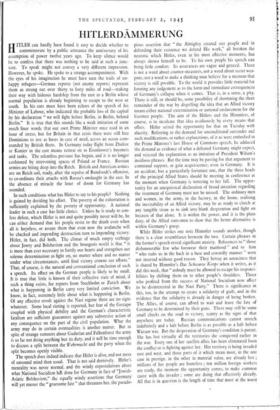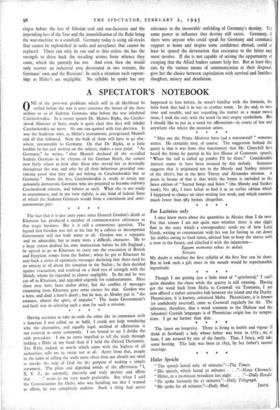HITLERDAMMERUNG
HITLER can hardly have found it easy to decide whether to commemorate by a public utterance the anniversary of his assumption of power twelve years ago. To keep silence would be to confess that there was nothing to be said at such a junc- ture. To speak might not convey a very different impression. However, he spoke. He spoke to a strange accompaniment. With the eyes of his imagination he must have seen the trails of un- happy refugees—German reports (not enemy reports) represent them as strung out over thirty to forty miles of road—making their way with hideous hardship from the east to a Berlin whose normal population is already beginning to escape to the west or south. In his ears must have been echoes of the speech of his Minister of Labour, who indicated the probable loss of the capital by his declaration " we will fight before Berlin, in Berlin, behind Berlin." It is true that this sounds like a weak imitation of some much finer words that our own Prime Minister once used in an hour of stress, but for Britain in that crisis there were still free Dominions to use as bases in case of need, across an ocean com- manded by British fleets. In Germany today flight from Zhukov or Koniev in the east means retreat on to Eisenhower's bayonets and tanks. The relentless pressure has begun, and it is no longer cushioned by intervening spaces of Poland or France. Russian armies are biting deep into the Reich. British and American armies are on Reich soil, ready, after the repulse of Rundstedt's offensive, to co-ordinate their .attacks with Russia's onslaught in the east. In the absence of miracle the hour of doom for Germany has sounded.
In such conditions what has Hitler to say to his people? Nothing is gained by deriding his effort. The poverty of the exhortation is sufficiently explained by the poverty of opportunity. A national leader in such a case has little choice. Unless he is ready to con- fess defeat, which Hitler is not and quite possibly never will be, he can either demand that his people resist to the death even when all is hopeless, or assure them that even now the avalanche will be checked and impending destruction turn to impending victory. Hitler, in fact, did both. The climax of much empty verbiage about Jewry and Bolshevism and the bourgeois world is that " it is more than ever necessary to fortify our hearts and strengthen our solemn determination to fight on, no matter where and no matter under what circumstances, until final victory crowns our efforts." That, of course, is the natural and conventional conclusion of such a speech. Its effect on the German people is likely to be small. It is true that little is known of their collective state of mind, if such a thing exists, for reports from Stockholm or Zurich about what is happening in Berlin carry very limited conviction. We know, in fact, extremely little about what is happening in Berlin. Of any effective revolt against the Nazi regime there are no signs whatever. Some local rioting is reported, but fear of the Gestapo coupled with physical debility and the German's characteristic fatalism are sufficient guarantees against any subversive action of any consequence on the part of the civil population. What the army may do in certain eventualities is another matter. But in spite of strange rumours about Guderian and Falkenhorst the army is so far not doing anything but its duty, and it will be time enough to discuss a split between the Wehrmacht and the party when the split becomes openly visible. The speech does indeed indicate that Hitler is alive, and not more of unsound mind than usual. That is not said derisively. Hitler's mentality was never normal, and the windy expostulations about what National Socialism hit done for Germany in face of "Jewish- Asiatic Bolshevism," the equally windy assertions that Germany will yet master the " gruesome fate " that threatens her, the pseudo- pious assertion that " the Almighty created our people and ' in defending their existence we defend His work," all betoken the neurotic which Hitler, even in his most effective moments, has always shown himself to be. To his own people his speech can bring little comfort. Its assurances are vague and general. There is not a word about counter-measures, not a word about secret wea- pons, not a word to make a thinking man believe for a moment that victory is still possible. To the world it provides little material for forming any judgement as to the form'and immediate consequences of Germany's collapse when it comes. That is, in a sense, a pity. There is still, or should be, some possibility of shortening the short remainder of the war by dispelling the idea that an Allied victory means either national extermination or national enslavement for the German people. The aim of the Hiders and the Himmlers, of course, is to inculcate that idea assiduously by every means that offers. Hitler seized the opportunity for that on Tuesday with alacrity. Referring to the demand for unconditional surrender and such modifications, or rather explanations, of it as were embodied in the Prime Minister's last House of Commons speech, he adduced the demand as evidence of what a defeated Germany might expect, and rejected the explanation as an imitation of President Wilson's insidious phrases. But the time may be passing for that argument to command support, or gain acquiescence, even in Germany. It is an accident, but a particularly fortunate one, that the three heads of the principal Allied States should be meeting in conference at the moment when Germany is tottering to her fall. The oppor- tunity for an unequivocal declaration of broad intention regarding the treatment of Germany must not be missed. The ordinary men and women, in the army, in the factory, in the home, realising the inevitability of an Allied victory, may be as ready to clutch at any tangible straw as to sink into blank desperation and fight on because of that alone. It is within the power, and it is the plain duty, of the Allied statesmen to show that the better alternative is within Germany's grasp.
While Hitler strikes one note Himmler sounds another, though there is a clear resemblance between the two. Certain phrases in the former's speech reveal significant anxiety. References to " those dishonourable few who forswear their manhood " and to him " who stabs us in the back in a base and cowardly manner " were not inserted without good reason. They betray an uneasiness that is shared by Himmler's Das Schwarze Korps when it writes, as it did this week, that " nobody must be allowed to escape his responsi- bilities by shifting them on to other people's shoulders. Those who profited from the success of National Socialism now affect to be disinterested in the Nazi Party." There is significance in this, too, in the attempt to create a solidarity of guilt, and in the evidence that the solidarity is already in danger of being broken. The Allies, of course, can afford to wait and leave the fate of Germany to be determined by their guns. There may still be some small checks on the road to victory, scanty as the signs of that anywhere are today. Russian communications cannot stretch indefinitely and a halt before Berlin is as possible as a halt before Warsaw was. But the desperation of Germany's condition is patent. She has lost virtually all the territories she conquered earlier in the war. Every one of her satellite allies has been eliminated from the conflict or is fighting against her. Her territory is being invaded east and west, and those parts of it which mean most, in the one case in prestige, in the other in material value, are already lost ; millions of her people are homeless ; ten million foreign workers are ready, the moment the opportunity comes, to make common cause with the invader ; some are doing that effectively already. All that is in question is the length of time that must at the worst elapse before the loss of Silesian coal and war-factories and the impending loss of the Saar and the *mobilisation of the Ruhr bring the war-machine to a standstill. Germany today is using oil-stocks that cannot be replenished in tanks and aeroplanes that cannot be replaced. There can only be one end to that unless she has the strength to drive back the invading armies from whence they came, which she .patently has not. And even then she would only recover an industrial area devastated in two retreats, the Germans' own and the Russians'. In such a situation such vapour- ings as Hitler's are negligible. No syllable he spoke has any relevance to the inexorable unfolding of Germany's destiny. Yet some power to influence that destiny still exists. Germany, if there were anyone who could speak for Germany and command support at home and inspire some confidence abroad, could at least be spared the devastation that resistance to the bitter end must involve. If she is not capable of seizing the opportunity of escaping that the Allied leaders cannot help her. But at least they can, by the various means of communication at their disposal, give her the choice between capitulation with stirvival and limitless slaughter, misery and desolation.



























 Previous page
Previous page